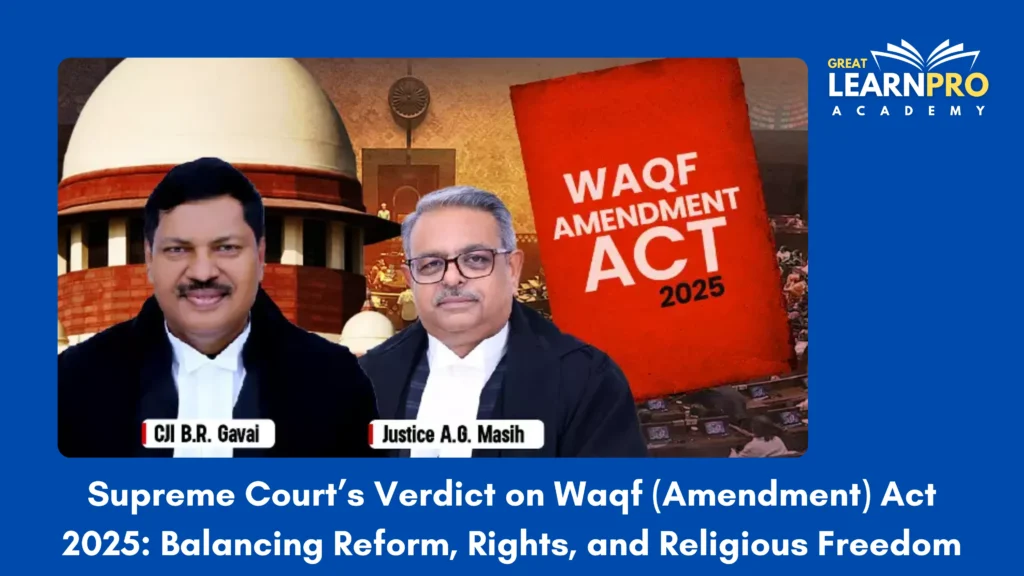On September 15, 2025, the Supreme Court of India delivered a significant interim verdict on petitions challenging the Waqf (Amendment) Act, 2025. The Court struck a careful balance upholding most of the statute but staying certain controversial provisions that raised constitutional alarms. The ruling is set to shape the future of how India regulates waqf properties, which cover nearly 8 lakh registered parcels of land and play a crucial role in community welfare, heritage preservation, and religious freedom.

Key Issues Before the Court
- Five-Year Islam Practice Clause
The amendment required that only someone who has practised Islam for at least five years can create a waqf. Petitioners argued this was discriminatory and violated Articles 14, 15, 25 and 26, since no such religious test exists for Hindu, Sikh, or Christian endowments. - Abolition of “Waqf by User”
Historically, properties used for religious/charitable purposes without formal deeds were recognised as waqf. The Act prospectively abolishes such recognition, threatening mosques, graveyards, and heritage spaces maintained for centuries. Petitioners said this retroactively unsettles long-established rights and contradicts precedents such as Ayodhya. - Executive Powers & Lack of Due Process
The Act empowers district collectors and other officers to decide whether a property is waqf or government land. Critics argued this shifts adjudication from judicial/quasi-judicial forums to the executive, raising concerns of arbitrariness and harassment. - Governance of Waqf Boards
The inclusion of non-Muslims in State Waqf Boards and the enhanced role of the Centre in appointments were said to dilute the autonomy of religious communities, undermining Article 26 - Federalism Concerns
Waqf administration has been largely a state subject. Petitioners claimed the Act tilts the balance towards centralisation, infringing the federal structure.
What the Court Held
- No blanket stay: The Court reaffirmed the presumption of constitutionality of parliamentary laws. Unless a statute is “manifestly unconstitutional,” courts should not suspend it wholesale.
- Partial stay granted:
- The five-year Islam practice clause has been stayed.
- Certain provisions relating to executive powers over property disputes and altered governance structures have also been put on hold.
- Continuity preserved: Existing waqfs and registered properties will not be disturbed until a final decision. The Court recognised the risk of irreparable injury if ancient religious endowments lose legal protection.
Broader Constitutional Themes
- Equality & Non-Discrimination
The five-year clause violated the principle of equal treatment by imposing a religious test unique to Muslims. The Court’s stay reaffirms that state regulation cannot impose hostile discrimination against a single community. - Religious Autonomy vs State Regulation
The ruling highlights the delicate balance between reforming waqf governance and protecting the community’s right to manage its religious affairs. While transparency and accountability are valid state goals, excessive intrusion risks violating Articles 25–26. - Due Process and Rule of Law
Empowering collectors to unilaterally decide land status without proper judicial safeguards was seen as a recipe for arbitrariness. The Court hinted that due process must be respected in resolving property disputes. - Federalism
By centralising control over State Waqf Boards, the Act raised questions about constitutional federalism. Though not struck down, the Court has kept such provisions under scrutiny. - Vagueness & Arbitrary Standards
Terms like “practised Islam for five years” are vague and hard to prove, inviting arbitrary interpretations. The Court has effectively frozen such vague clauses to prevent misuse.
Practical Implications
- Implementation Uncertainty: With parts of the Act stayed, waqf boards, mutawallis (custodians), and state governments face uncertainty about registration, governance, and dispute resolution.
- Impact on Heritage Properties: Many mosques, dargahs, and graveyards maintained by usage face risk if “waqf by user” is removed. Until final judgment, they are protected, but the long-term outcome remains uncertain.
- Burden on the Marginalised: Smaller mutawallis may lack resources to meet stricter documentation rules, raising fears that poor communities could disproportionately lose property rights.
- Precedent Setting: The judgment signals that Parliament can pursue reform, but cannot undermine fundamental rights, especially minority rights. Future amendments to religious endowment laws will be judged by this standard.
Reactions
- Government: Union Minister Kiren Rijiju hailed the verdict as validation of reform, noting that the Act remains largely in effect.
- Petitioners: Activists like Muhammad Jameel Merchant called it a “limited victory,” emphasising that deeper constitutional issues remain unresolved.
- AIMPLB: The All India Muslim Personal Law Board termed the order “incomplete and unsatisfactory,” warning of misuse of surviving provisions.
- Regional Parties: Kashmiri groups demanded further review to remove all objectionable clauses that infringe religious freedom.
Conclusion
The Supreme Court’s interim ruling on the Waqf (Amendment) Act, 2025 is a measured middle path it permits reform to continue but draws red lines where constitutional rights risk being trampled. The upcoming final hearings will decide whether Parliament’s push for transparency and accountability can coexist with the historical, religious, and cultural significance of waqfs. Until then, the verdict serves as both a safeguard for minority rights and a reminder of the limits of state power over religion.
Sources:
- https://www.ndtv.com/india-news/big-supreme-court-order-on-waqf-amendment-act-key-provisions-stayed-9278534?utm_
- https://www.indiatoday.in/india-today-insight/story/5-big-takeaways-from-supreme-court-verdict-on-waqf-amendment-act-2787660-2025-09-15?utm_
More Current affairs: https://learnproacademy.in/updates/
